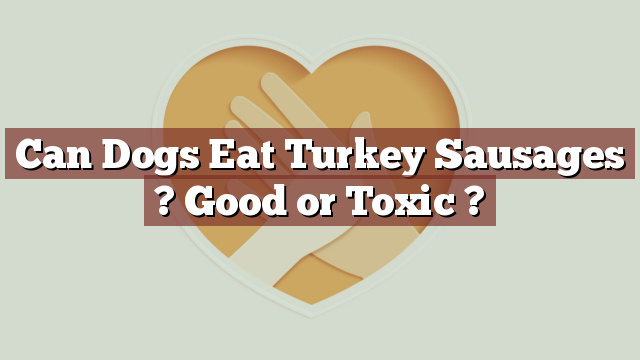Can Dogs Eat Turkey Sausages? Good or Toxic?
It is important for pet owners to be aware of what foods are safe for their furry friends to consume. While we may enjoy indulging in delicious treats such as turkey sausages, it is essential to determine whether or not our dogs can partake in this culinary delight. In this article, we will explore the nutritional value of turkey sausages for dogs, discuss their safety and potential risks, and provide guidance on what to do if your dog has consumed them.
Nutritional Value of Turkey Sausages for Dogs: What You Should Know
Turkey sausages are a popular choice for many individuals due to their savory taste and high protein content. These sausages are often made from lean turkey meat and can be a good source of essential nutrients. The nutritional value of turkey sausages includes protein, vitamins B3 and B6, selenium, and phosphorus. Protein is particularly important for dogs as it supports their overall growth and development.
However, it is crucial to note that turkey sausages can also be high in sodium and fat content. Excessive consumption of foods high in sodium and fat may lead to various health issues for our canine companions, such as obesity, pancreatitis, or gastrointestinal upset.
Can Dogs Eat Turkey Sausages? Safety and Toxicity Explained
No, dogs should not consume turkey sausages. While turkey meat itself is generally safe for dogs, sausages often contain additional ingredients such as spices, garlic, onion, and preservatives, which can be toxic to our furry friends. Garlic and onion, in particular, are known to cause damage to a dog’s red blood cells and can lead to anemia. Additionally, the high sodium and fat content in sausages can be detrimental to a dog’s health if consumed regularly or in large quantities.
It is important to remember that each dog is unique, and their tolerance to specific foods may vary. However, due to the potential risks associated with turkey sausages, it is best to err on the side of caution and avoid feeding them to your canine companion.
Potential Risks or Benefits of Feeding Dogs Turkey Sausages
Feeding your dog turkey sausages can pose several risks to their health. As mentioned earlier, the spices, garlic, onion, and preservatives commonly found in sausages can be toxic to dogs and should be avoided. Moreover, the high sodium and fat content in sausages can lead to obesity, pancreatitis, and gastrointestinal issues.
While there may be some nutritional benefits from the lean turkey meat itself, these benefits can easily be obtained from other sources that do not carry the same risks. It is always advisable to choose safer alternatives that are specifically formulated for canine consumption.
My Dog Ate Turkey Sausages: What Should I Do?
If your dog has accidentally consumed turkey sausages, it is important to monitor their behavior and watch for any unusual symptoms. If your dog exhibits signs of illness such as vomiting, diarrhea, abdominal pain, or weakness, it is crucial to contact your veterinarian immediately. They will be able to provide you with appropriate guidance based on your dog’s individual situation.
Conclusion: Moderation and Consultation are Key
In conclusion, it is best to avoid feeding turkey sausages to your dog due to the potential risks associated with the ingredients and high sodium and fat content. While small amounts of lean turkey meat may be safe for your pet, it is always advisable to consult with your veterinarian before introducing any new food into your dog’s diet. Remember, ensuring your dog’s safety and well-being should be the top priority when it comes to their dietary choices.
Thank you for investing your time in exploring [page_title] on Can-Eat.org. Our goal is to provide readers like you with thorough and reliable information about various dietary topics. Each article, including [page_title], stems from diligent research and a passion for understanding the nuances of our food choices. We believe that knowledge is a vital step towards making informed and healthy decisions. However, while "[page_title]" sheds light on its specific topic, it's crucial to remember that everyone's body reacts differently to foods and dietary changes. What might be beneficial for one person could have different effects on another. Before you consider integrating suggestions or insights from "[page_title]" into your diet, it's always wise to consult with a nutritionist or healthcare professional. Their specialized knowledge ensures that you're making choices best suited to your individual health needs. As you navigate [page_title], be mindful of potential allergies, intolerances, or unique dietary requirements you may have. No singular article can capture the vast diversity of human health, and individualized guidance is invaluable. The content provided in [page_title] serves as a general guide. It is not, by any means, a substitute for personalized medical or nutritional advice. Your health should always be the top priority, and professional guidance is the best path forward. In your journey towards a balanced and nutritious lifestyle, we hope that [page_title] serves as a helpful stepping stone. Remember, informed decisions lead to healthier outcomes. Thank you for trusting Can-Eat.org. Continue exploring, learning, and prioritizing your health. Cheers to a well-informed and healthier future!

